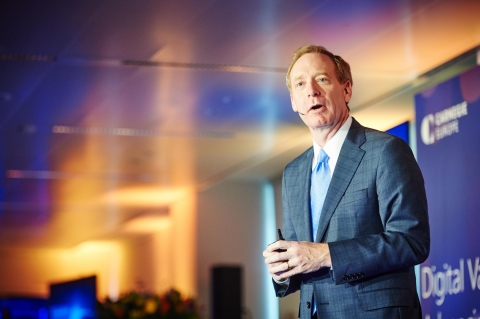Nov302016
Posted at 12:40 PM
Guest blog post by Brad Smith, President of Microsoft
Without question, the nature of jobs and work is changing. New digital technologies are reshaping the tasks that make up our daily work. Jobs themselves increasingly reflect new alternative arrangements, including contract, freelance, and so-called “gig economy” work for digital intermediaries such as Uber, Lyft, and Handy. On the one hand, Yogi Berra clearly got it right when he said that “it’s tough to make predictions, especially about the future.” But one thing is clear: jobs and work in the future will be different from the past.
The bigger question is whether we can construct a future that enables all Americans to benefit from these changes. This has been the central focus of the working group I’ve been chairing this year for the Digital Economy Board of Advisors, or DEBA. In March, Commerce Secretary Penny Pritzker appointed 17 individuals to serve on DEBA for a two-year term. We’ll come together on December 15 to share with the Secretary and the public what we’ve learned to date.
The reality is that the changing nature of jobs and work is creating both opportunities and challenges. On the one hand, more people today are taking advantage of the opportunity to work in new ways. Many are working remotely, while others are working as independent contractors or in other arrangements. A recent study by the McKinsey Global Institute estimated that between 54 million and 68 million Americans now engage as self-employed or temporary workers. Over half of these individuals use independent work to supplement their pay rather than earn their primary income from it. Some people work part-time because they cannot find a full-time job, but increasingly many others work fewer hours or have multiple sources of income because they prefer this arrangement.
But new challenges have arisen as well. Individuals need to learn new skills to keep pace, and this isn’t always easy. Over the next decade this could become more daunting still, as technology continues to change rapidly. There is a broadening need for new technical skills and stronger soft skills. The ability – and opportunity – to continue learning has itself become more important.
Given all this, a “healthy digital economy” needs to be a “learning economy” where the ability of the workforce to continue learning is fundamental to healthy employment growth. This too will require innovation.
One key to unleashing this innovation will be a sense of shared responsibility. New solutions will need to come from employers across the private sector, from educational institutions, from the creators of technology tools, and from the public sector at all levels. And critically, all of us will need to pursue with a sense of individual responsibility these lifelong learning opportunities.
These new issues will not just occupy but may define part of the future of the Department of Commerce. The Department can play a leadership role within the Federal Government in addressing these new needs. Future opportunities for Americans throughout our economy will depend on the Department seizing this opportunity and playing this role well.
This blog is a part of a monthly series highlighting the contributions of the Commerce Department’s agencies to the Open for Business Agenda. This month’s focus is on Skills for Business.

